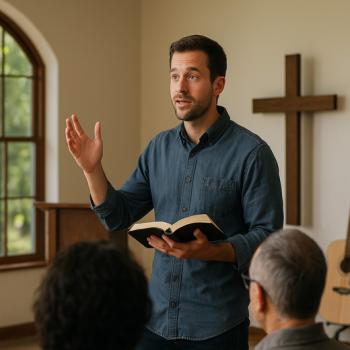In what book of the Bible, do we encounter the name that is actually a promise: "Immanuel"—"God with us"?
Where do we first hear the name "Prince of Peace" given to the Messiah?
Where do we find the promise that someday the lion and lamb will lie down together, that every valley will be exalted, that there is good news for the poor, release for the captives, recovery of sight to the blind, and freedom for the oppressed?
Where do all these words of comfort and assurance appear?
The Book of Isaiah.
We take some things for granted and don't feel that they require our full attention. That's not a world-shaking insight, I'll grant you, but we're reminded of it over and over if we have our eyes—or ears—open. I was telling my American literature class the other day about a song I had been hearing for 30 years. It came on the radio, and I suddenly realized that I had been mishearing the lyrics my whole adult life. It was so familiar; I didn't think I had to give any thought to it.
That's an insight we could apply to Isaiah, which is the source of so much of our Christian theology and liturgical language that we often fail to give it proper attention. There's an old joke—probably only funny to Ph.D.s in English—about the student who complains about studying Hamlet because it's just a bunch of famous quotations strung together.
But Isaiah continually rewards our attention, even though it too seems like a bunch of famous quotations strung together, because those famous quotations are at the heart of our faith.
We don't know much about the prophet—or prophets—whose words are recorded for us in the book we call Isaiah, but as we've noted, the words recorded there are some of the most significant in our tradition. The name Isaiah means "Yahweh Saves," or "the LORD is salvation," and that is the beginning of comfort in itself. Rabbi Joseph Telushkin tells us in Biblical Literacy that in Jewish tradition, Isaiah was thought to be the nephew of King Amaziah, and thus was a person both "worldly and pious, a man with a vision both of this world and the next." In that vision, we see the Messiah predicted, ethical failures indicted, and Isaiah's dream of a world where God's reign will bring peace.
In our tradition, Isaiah is revered as the prophet most closely connected to the Christian understanding of Jesus as the Anointed One of God; St. Jerome actually spoke of Isaiah as the fifth gospel. In the Christian Testament (with the exception of the Psalms) it's the most quoted book of the Hebrew Testament, and it appears in some seminal moments—when Jesus inaugurates his public ministry in Luke, say, or in any of the Gospels when John the Baptist quotes Isaiah to describe what he's come to do and the savior for whom he's come to prepare the way.
Isaiah also tells us much about our savior. He names him and describes his qualities in Chapter 9:
The people who walked in darkness
have seen a great light;
those who lived in a land of deep darkness-
on them light has shined.
For a child has been born for us,
a son given to us;
authority rests upon his shoulders;
and he is named
Wonderful Counselor, Mighty God,
Everlasting Father, Prince of Peace. (Isaiah 9: 2, 6, NRSV)
Advent is a season, about comfort, among other things. It's about seeing things as they are, truly, and knowing we have been given strength and promised joy. It's about our faith in a loving God, who created us and seeks to draw us ever closer to God. As Rowan Williams puts it in Tokens of Trust, above all, our God is worthy of Trust. The God who has created us and redeemed us will not let us go.
This time of year is for some people the most joyful—and for others the most painful. Our culture is continually telling us that we should be happy at this time of year, that we should be eating and drinking and buying and receiving. I love seeing friends and family. I love being solvent enough to buy Christmas gifts for those I love. And yet I'd be the first to say that this season is one of the most challenging of the year.
Because I have also been one of those unable because of sickness or distance to be with friends and family, been too poor to buy the gifts we've been told for several weeks now are waiting for us to pick up at holiday sales, been unsure about what the coming year would be bringing. If you're not feeling particularly joyful this Advent, please know that you're not the only one.





